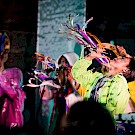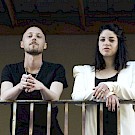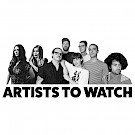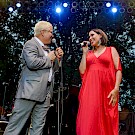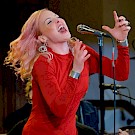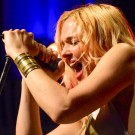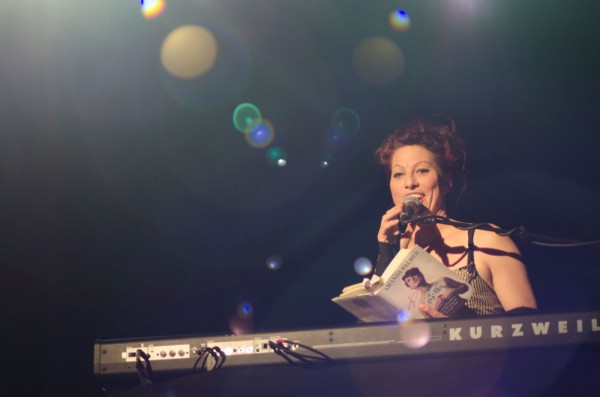 Click to see a whole gallery of photos by Chelsea Gaya
Click to see a whole gallery of photos by Chelsea GayaThe wildly decorated people stood in the bleak cold, queued up in what could have been a fancy beggars breadline and looking as if the circus or the Comic Con had just let out for the night... but the show was just about to start.
The warm and eclectic crowd, smelling of musk, fur, incense and leather, pushed their way into the Wonder Ballroom on November 19—a gorgeous herd of afghan covered gypsies, finger-gloved and lip-pierced, wrapped in kimonos, wearing peacock feather fascinators. They were darkly clad, tribal-tattooed, bustiered, crow-black coiffed and mohawked. Some wore layers of tablecloth hiked up for skirts, some sported jackets fit for a white linen dinner. One girl, a bony bride in a skeleton sweatjacket, paraded past with a mass of cotton candy magenta-colored hair crowned by a headband of black flowers with a flowing, spidery veil. They came in pageboy and bowler hats armed with ukuleles. They were circus beauties and sideshow outcasts, a fanciful, freakish canvas of carnival color, and they were all here to see the woman who they were imitating in their costumed incarnations of her many looks. Miss Amanda Fucking Palmer.
The ticket was "An Evening With Amanda Palmer: The Art of Asking Book Tour," brought to us by Powell’s Books, and it delivered on the promise of an evening interspersed with heartfelt book readings, musical performances, special guests and an interview section. The stage was set with a comfy assortment of furniture and flowers: a gold corduroy arm chair, a red loveseat, floor lamps, and a small square table to hold drinks. Palmer made an entrance in her side-gathered, pinstriped dress, fishnets, and amazing Technicolor Dreamcoat-inspired patchwork kimono, her two fists raised above her head like a prizefighter. She clutched a red ukulele in one hand and a bottle of champagne in the other.
“I made a book,” she offered coyly into the mic. “I’m in Portland, a not somehow, inhospitable place. And I made The New York Times list today at number fucking seven.” This brought howls and cheers.
“George Bush is number one,” she followed up by gloomy comparison, and this brought angry boos.
Her hand-painted, star-trail brow lowered in dark conspiracy and she quietly hissed, “Wait.”
We all laughed and she also assured us that “hippies and ukuleles were going to win.” Those two things were definitely well-represented in the crowd. She knew us. She had us. We were her tribe. And we all felt like we were winning alongside her as she shook and uncorked the champagne with a pop, and as bubbly overflowed, she passed some into the front row.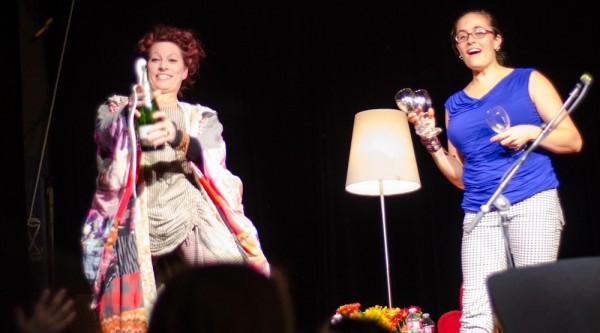
Palmer led with “In My Mind,” singing:
In my mind
In a future five years from now
I'm one hundred and twenty pounds
And I never get hung over
Because I will be the picture of discipline
Never minding what state I'm in
And I will be someone I admire
“Am I blurry to you,” she asked the audience. “Because I’m hungover. The tremor is real.”
Palmer told a heartbreaking story of relationship disaster when she was last in Portland. The boyfriend, named Michael, was a predecessor to now-husband Neil Gaiman and fellow successful, beloved author. Michael had broken it off but his sister had attended the show, bringing banana bread and a letter from their mother, welcoming her to the family and yet, she still had to perform. The show must go on, after all. This current success of being named a New York Times best-selling author on the day she flew into Portland crushed that old memory and rewrote it triumphantly.
Palmer read two excerpts from her new book, The Art of Asking: How I Learned to Stop Worrying and Let People Help and spoke about how the money one needs to live is indistinguishable from the money one needs to make art, how it all cycles in and out—you’re up, you’re down, you beg and you borrow, you ask for help and it all works out in the end, all while maintaining your authenticity and creativity. She led with a reading about her early days working as a living statue in the streets of Boston—a story she tells in her now famously compelling TED Talk, for which this book on the art of asking is an expanded conversation. She illustrated this further in a second excerpt about an obscure biographical detail in the life of Henry David Thoreau—who as it turns out, may not have been as self-reliant as we were led to believe, and how that was okay too.
She read:
Thoreau wrote in painstaking detail about how he chose to remove himself from society to live “by his own means” in a little 10-foot by 15-foot hand-hewn cabin on the side of a pond. What he left out of Walden, though, was the fact that the land he built on was borrowed from his wealthy neighbor, that his pal Ralph Waldo Emerson had him over for dinner all the time, and that every Sunday, Thoreau’s mother and sister brought over a basket of freshly-baked goods for him, including donuts.
The idea of Thoreau gazing thoughtfully over the expanse of transcendental Walden Pond, a bluebird alighting onto his threadbare shoe, all the while eating donuts that his mom brought him just doesn’t jibe with most people’s picture of him as a self-reliant, noble, marrow-sucking, back-to-the-woods folk-hero.
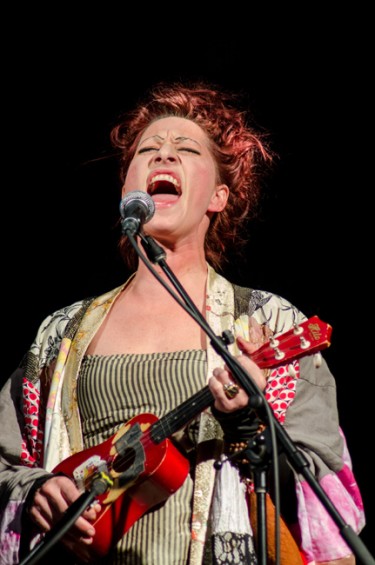
But Palmer explained that those safety nets, that comfort in our community is what keeps people going, but it’s the asking that makes it feel shameful: “Taking the doughnuts is hard for a lot of people,” she read.
She continued and this salient, sweet doughnuts point continued to resonate throughout the evening:
It’s not the act of taking that’s so difficult; it’s more the fear of what other people are going to think when they see us slaving away at our manuscript about the pure transcendence of nature and the importance of self-reliance and simplicity. While munching on someone else’s donuts.
Maybe it comes back to that same old issue: We just can’t see what we do as important enough to merit the help, the love.
Try to picture getting angry at Einstein devouring a donut brought to him by his assistant, while he sat slaving on the theory of relativity. Try to picture getting angry at Florence Nightingale for snacking on a donuts while taking a break from tirelessly helping the sick.
To the artists, creators, scientists, nonprofit-runners, librarians, strange-thinkers, start-uppers and inventors, to all people everywhere who are afraid to accept the help, in whatever form it’s appearing,
Please, take the donuts.
To the guy in my opening band who was too ashamed to go out into the crowd and accept money for his band,
Take the donuts.
To the girl who spent her 20s as a street performer and stripper living on less than $700 a month who went on to marry a best-selling author who she loves, unquestioningly, but even that massive love can’t break her unwillingness to accept his financial help, please….
Everybody.
Please.
Just take the fucking donuts.
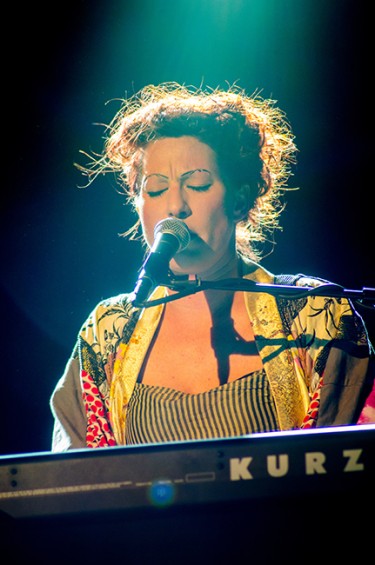
Shortly after, Palmer stepped behind her Kurzweil piano with the attack song “Runs In The Family,” and slayed it with lyric spitting, key-pounding ferocity. She tapped and stroked the piano keys with her book upon finishing, declaring it a “bad piano player,” and shook it in front of her explaining that the trick about art is “you don’t talk about your own—you make people look at it and they explain it to you.”
She read a lovely chapter about trusting herself and others, and how she learned those lessons from her lifelong relationship with C. Anthony Martignetti, an author and psychotherapist, whom she has known and described as a mentor, guru and best friend since she was 9 years old. “He never told me what to do,” Palmer explained. “Instead, he told me stories. Stories about his life, stories about Zen masters, stories about his father, stories about his grandfather, stories about old farmers.” Martignetti is currently undergoing treatment for leukemia, a painful journey Palmer shared, apologizing in advance for any unscheduled performance cancellations and talking about how she pushed him to write and publish a collection of his own short stories.
Whitney Moses, another age-old friend from the touring days of The Dresden Dolls was described by Palmer as wearing many hats—friend, road manager, singer and member of the San Francisco-based retro-soul band Midtown Social. In addition to serving up champagne and wrangling microphone stands, Moses joined Palmer on The Dresden Dolls song “Delilah” with gentle harmonies and throaty chorus yodels.
Next up was was the inspiring and local community-cultivating part of the show. Antje Martina Schaefer, by extension, a friend of Moses’, was given the opportunity to introduce the Nectar Fusion Project as part of a nonprofit dance studio in Portland called the Connexus Dance Collective, which “produces intentional, transformative dance events that promote authentic connection, respectful relations, and movement education.” After promoting her project, which was created entirely out of pocket with all proceeds going directly to covering event expenses, Schaefer was joined onstage by her friend Sophia for a short dance demo with Palmer playing an improvised piano piece. The Nectar Fusion Project also features another local, Portland’s Mr. Moo accompanying the dancers for live sets. (Listen to his recent Mixtape Monday—a musical love letter to Portland's rainy fall weather.)
Instead of calling out the name of the city in stadium rock star fashion, Palmer followed with an appropriately local-flavored excerpt from the book about a past house show she performed in Portland. She also managed to invoke the name of our beloved bookstore in the piece, to cheerful applause of course. A hearty patch of handclaps in the audience acknowledged having been at the house show and Palmer described her wonderful experience with the open, quirky and gentle people of Portland, including her headdress designing host, Susan. Matronly, motherly Susan had presented Palmer with a handmade headdress festooned with antlers and all but tucked her into bed at the end of the night in her own daughter’s room.
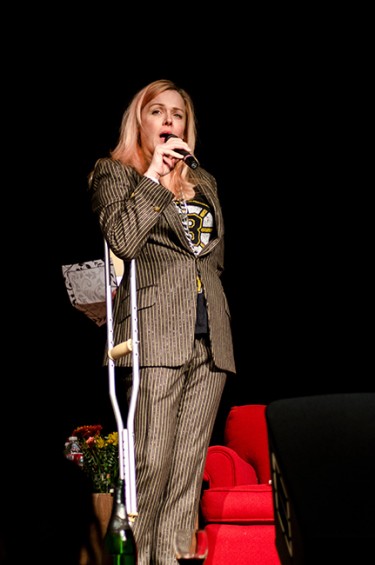
Palmer then called local songstress legend Storm Large to the stage for a little song and dance. Well—as it happens, Storm hobbled barefoot onstage in a 1920s mobster-flavored, black-and-gold pinstriped suit with a Boston Bruins T-shirt beneath. She leaned on her crutch like a gangster on a Gatling gun, and it was evident that even after a recent knee surgery, the addition of a little whiskey to cut the pain had no negative effect on her ability to tear up a song. Storm crooned "I Google You" (co-written by Palmer—music—and Gaiman—lyrics) with perfect torch-singer grace—sultry, sanguine, sweet and silly in all the right measures, and Palmer looked on from behind her piano, beaming with the proud knowledge that Storm was absolutely killing it.
For the discussion portion of the show, Amanda Palmer and Storm Large were joined onstage by freelance comic artist Erika Moen, (creator of Oh Joy Sex Toy). It would be both foolish and impossible to try and parse the hour-long, brilliant, live and impromptu conversation between these three women. Imagine a free-form, bawdy version of The View with some notecard Q. and A. prompts from the audience near the end, and that’s about what ensued. Really, what you need is a transcript, but once again, bless the magic of the internet’s ability to share and save everything in full-on, life-casting style—Palmer’s film crew did us all the courtesy of capturing it and you can watch the whole thing on YouTube. I strongly encourage you to watch it.
Early on, Storm set the tone and hilariously observed, “When art and commerce come together, it’s not only like strange bedfellows, it’s like Mother Nature having a three-way with Wall Street and Washington D.C. It’s the weirdest orgy where everyone’s uncomfortable.”
The conversation explored how this goes doubly for women in the arts who are constantly battling to find visibility, to see their correctly contextualized, non-sexualized voice and image uniquely represented in our culture. Women artists are afraid to create, share and speak loudly in their painting, music or writing because they fear the casual cruelty of the internet; they fear being branded as bad feminists. Palmer noted women who recently published books, including Lena Dunham, Laurie Penny, Amy Poehler and Caitlin Moran, who are “getting so punished for telling their stories not quite right,” and asked, “How do we make the ecosystem safe enough for everyone to just tell their fucking story the way they know how and the way they want to?”
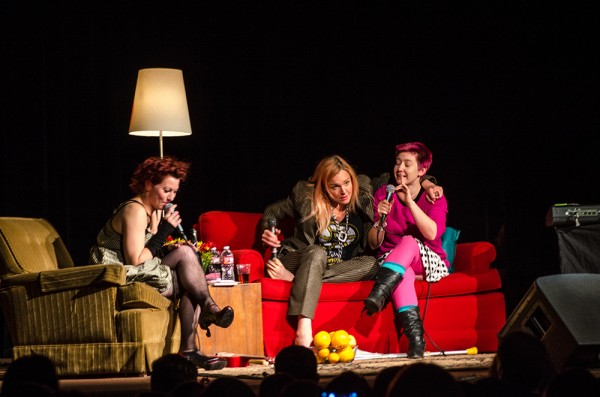 Amanda Fucking Palmer, Storm Large and Erika Moen onstage at the Wonder Ballroom
Amanda Fucking Palmer, Storm Large and Erika Moen onstage at the Wonder BallroomThey navigated deftly between the topics of art, music, social media, sex, feminism, crowdfunding and the concept of the “overshare,” with a critical eye and philosophical precision. They discussed the double-edged sword of internet culture to be both connecting and divisive. And they did all this with improvisational humor, wicked irreverence, and equal parts deep love and sensitivity. Some highlights include Storm inventing “Whack-A-Troll,” a reality TV game show for punishing vicious online haters and YouTube commenters, shaming into submission those who partake in easy outrage on the internet. Palmer talked about her mother, who worked as a computer programmer and was an artist in her own right. The conversation ever-returned to the shifting world of new media and how to distribute art, writing and music in an era of self-publishing, self-promoting and crowdfunding, especially when the tactics are causing panic in the corporations, book publishers, and both the film and music industries—all of which are losing traction and a way to cut themselves into the deal.
“The emphasis on art as being a spiritually important part of life has always existed,” Palmer noted, “it’s just the formats were different.” From vinyl, cassettes, CDs, books and handheld devices—the translation of physical media to digital, portable, streaming media and access to artists via social media has had the greatest impact on the delivery mechanisms.
“It’s why all of you are probably here,” Storm reiterated, “because the internet and technology—built for profit, built for commerce, built for communication, has eliminated so many middlemen. You get your art. You demand the art that you want and you get it in real time.”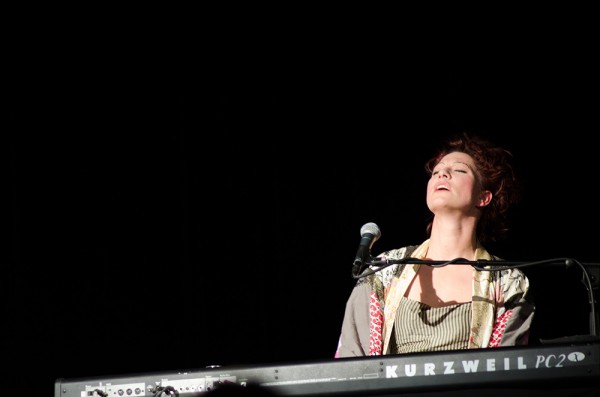
Concerned with having enough time to sign books, bodies and ukuleles, Palmer ended the session with her gratitude. “I could talk all night... this feels amazing. I feel so much happier here talking with a bunch of real human beings.”
“Maybe I am learning something here, and maybe,” Palmer continued, “the answer is I should just move to Portland and start a TV show.”
And the crowd went wild...
Palmer strummed her special guests offstage and wrapped up the show with a story about meeting Samantha Hess, local Portland entrepreneur, author of Touch: The Power of Human Connection, and professional cuddler who launched Cuddle Up To Me, a service for intimate, non-sexual, platonic, therapeutic touch. After describing her own healing cuddle session, Palmer held three golden cuddle tickets, delivering two gift certificates to Storm and Moen, and promised to give one randomly to someone in line for the book signing who looked like they needed it.
Palmer finished the evening with “Ukulele Anthem,” hiking her knee up on the monitor and spilling out the stream-of-consciousness, crowdsourced lyrics with urgency and the last of her energy.
The span of Palmer’s career as musician, feminist, commentator, poet, shit-stirrer, self-promoter, queen of the internet, and crowned champion of the Most Successful Kickstarter Campaign in History—$1.2 million from 25,000 donors—all of that legacy was on display. Add to that list now, New York Times Best-Selling Author. That sort of brave creativity is bound to inspire great envy, plenty of negative articles, blogs and commentary, and leave someone scathed open, vulnerable and fearful of reaching out. But not here, not this night.
Amanda Palmer’s readings, performances and discussions were filled with a sense of intimacy, warmth, safety, courage and love from strangers, fans and her guests, Storm Large and Erika Moen.
As she writes in her book: “This is how a creative human works: collecting, connecting and sharing.”


